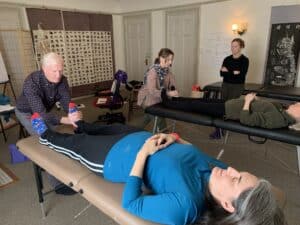If you experience frequent or chronic gut or intestinal issues, you’re not alone. Approximately 50% of Americans suffer from acid reflux or gastroesophageal reflux disease (GERD). Most people believe these conditions are caused by the overproduction of stomach acid, but they are actually the result of the back-up of stomach contents and acid into the esophagus.
Unfortunately, most prescription and over-the-counter (OTC) medications worsen these conditions over time. Antacids reduce the production of stomach acid instead of regulating the opening and closing of the lower esophageal sphincter (LES), which is necessary for keeping acids where they belong. When the LES valve continually functions improperly, your esophagus and stomach lining become chronically inflamed, resulting in hernias, ulcers, and/or acid reflux.
Thankfully, effective alternative treatments exist. We’ll explain these conditions in more detail and the ways in which you can treat them without relying on pills.
What is GERD?
Gastroesophageal reflux disease (GERD) is often referred to as heartburn, acid reflux, acid indigestion, and esophagitis. Typical symptoms include a burning sensation in the throat or chest, bitter mouth taste (especially after eating), or upper back, neck, and/or pain similar to that felt in a heart attack, regurgitation, burping, bloating, and general digestive discomfort (dyspepsia). Sufferers may also experience coughing that may be mistaken for a respiratory infection.
What Causes GERD?
Diet, stress and lifestyle are the most important contributing causes of GERD. This condition is caused by a malfunctioning lower esophageal sphincter (LES), which separates the esophagus and stomach. Smoking, alcohol, and certain foods cause the LES to relax, aggravating GERD. Nonetheless, other health conditions may also contribute to GERD, including pregnancy, hiatal hernia, or bacterial infection with Heliobacter pylori.
Heartburn is also a common side effect of many prescriptions, such as antidepressants and blood pressure medications. Check the labels to see if these apply and talk to your doctor about other available options.
Complications of GERD
If left untreated for too long, GERD can cause severe scarring of the esophagus. This increases the risk of esophageal cancer. Though this sounds scary, it is relatively rare. The most common outcome is simply prolonged misery and suffering that reduces your enjoyment of life.
Why Prescriptions & OTC Medications Hurt GERD More Than They Help
If you occasionally experience minor heartburn or need immediate relief, your doctor may suggest taking an antacid or a proton-pump inhibitor (PPI) like Prilosec. Unfortunately, long-term use of these medications creates more problems than it solves. The acid levels in the stomach become so low that digestive enzymes, like pepsin, can’t function well. Stomach acid levels are also your body’s defense system against food-borne illnesses, so you increase your risk of food poisoning.
Additionally, it is very easy for the body to become dependent on these medications. Stopping cold turkey after taking them for a long period of time can cause a rebound effect, which may make symptoms even worse and more painful than they were before.
GERD Triggers
There are many foods, liquids, and medications that further inflame the stomach and esophagus. These include, but are not limited to:
- Highly-Acidic Consumables: Alcohol, coffee, spicy foods, tomatoes, peppers, citrus, etc.
- Hard-to-digest fatty foods if consumed in large amounts
- LES Relaxers: Chocolate, cigarettes, peppermint
- Sugars & Refined Carbohydrates: Amplify & stimulate growth of “bad” bacteria in the gut flora
- NSAIDs (non-steroidal anti-inflammatories): Ibuprofen & aspirin
- Prescription medications: Read the label for side-effects
Improving GERD Through Lifestyle Changes
Fortunately, some simple lifestyle and behavioral changes can reduce your GERD symptoms. These include:
- Eat Slowly: Eating too fast doesn’t help the LES function properly. Eating more slowly and mindfully gives your body time to process food more effectively.
- Eat Smaller Amounts: Breaking large meals up into smaller, more frequent meals also allows your body to regulate the processing of food.
- Increase Fiber: Adding more fiber to your diet reduces the bloating that aggravates GERD
- Eat Upright: Maintaining good posture while eating helps keep acids where they belong. Never eat while lying down or slouching.
- Sleep with Intention: If GERD bothers you at night, try sleeping on your left side. This helps keep stomach acid far away from the esophageal sphincter.
Healing Your Gut Through Diet
In addition to lessening the symptoms of GERD, there are dietary and lifestyle adjustments that truly heal the gut. Try the following for lasting relief and wellness:
- Bone Broth: Lessens gastric irritation and helps the gut microbiome recover by feeding it the “good bacteria” we all need. This is a traditional treatment for GERD and other stomach conditions.
- Probiotic Foods: Cultured and fermented foods like sauerkraut, yogurt and kombucha introduce beneficial bacteria into the gut.
- Probiotic Supplements: High-quality probiotic supplements (such as Standard Process Prosynbiotic, a product we offer at Inner Works Acupuncture) is often the quickest way to introduce beneficial microbes and help the gut to heal.
Reduce Your Stress
Stress is a common trigger of heartburn and acid reflux symptoms, but the physiological mechanism for the underlying cause is still under debate by researchers. What we do know is that we perceive pain more intensely when we are stressed, which may worsen symptoms of GERD and other ailments. When we are very stressed, our bodies produce lower levels of prostaglandins, hormone-like substances that help protect the gut lining.
Treatment Methods Beyond Self-Care
To heal your gut holistically and quickly, you should also try alternative care treatments. The services we provide at Inner Works Acupuncture are proven very effective for reducing painful gut conditions. They include:
- Acupuncture: Balances the energy systems of the body, including digestion, and has long been used in China for treating digestive disorders. It is also a classic method for stress reduction.
- Zero Balancing: This bodywork system is a great stress-buster. Many clients use it for relaxation and reducing anxiety, in addition to relieving musculoskeletal pain.
- Chinese Herbs: There are many traditional herbal formulas for GERD and other digestive disorders. A qualified herbalist can prescribe a custom formula appropriate for you.
- Nutritional Supplements: In addition to a probiotic, other supplements may be prescribed to help balance the levels of stomach acid, support digestive enzymes and help the gut to heal.



